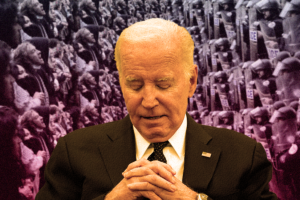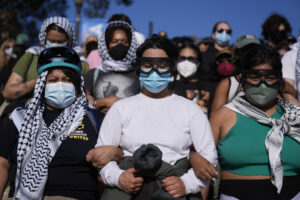Media Scorn Protestors for Distrust of Corporate Reporters
As campus demonstrations over the war in Gaza spread, mainstream pundits find a new way to discredit activists. Pro-Palestinian protesters chant at University of Chicago police while being kept from the university's quad as the student encampment is dismantled Tuesday, May 7, 2024, in Chicago. (AP Photo/Charles Rex Arbogast)
Pro-Palestinian protesters chant at University of Chicago police while being kept from the university's quad as the student encampment is dismantled Tuesday, May 7, 2024, in Chicago. (AP Photo/Charles Rex Arbogast)
An emerging complaint the corporate media have against the nationwide—and now international—peace encampments is that many student protesters won’t speak to them. The problem, pundits and reporters say, is that these encampments have designated media spokespeople, and other protesters often keep their mouths shut to the press.
Conservative pundit Peggy Noonan (Wall Street Journal, 5/2/24) said of her trip to the Columbia University encampment:
I was at Columbia hours before the police came in and liberated Hamilton Hall from its occupiers. Unlike protesters of the past, who were usually eager to share with others what they thought and why, these demonstrators would generally not speak or make eye contact with members of the press, or, as they say, “corporate media.”
I was on a bench taking notes as a group of young women, all in sunglasses, masks and kaffiyehs, walked by. “Friends, please come say hello and tell me what you think,” I called. They marched past, not making eye contact, save one, a beautiful girl of about 20. “I’m not trained,” she said. Which is what they’re instructed to say to corporate-media representatives who will twist your words. “I’m barely trained, you’re safe,” I called, and she laughed and half-halted. But her friends gave her a look and she conformed.
Peter Baker (Twitter, 5/4/24), the chief White House correspondent for the New York Times, supportively amplified the former Ronald Reagan speechwriter’s claim, saying the protests are “not about actually explaining your cause or trying to engage journalists who are there to listen.”
A reporter for KTLA (4/29/24) complained that his news team was not granted access to the encampment at UCLA, and Fox News (4/30/24) had a similar complaint about the New York University protest:
Fox News Digital was told that the outlet was not allowed inside, and only student press could access the gated lawn. A local ABC team and several independent reporters were also denied. However, Fox News Digital witnessed a documentary crew and a reporter from Al Jazeera reporting inside the area.
One has to wonder: What could make activists suspect that the network that produced “Anti-Israel Agitators: Signs of ‘Foreign Assistance’ Emerge in Columbia, NYU Unrest” (4/26/24), “Pressure Builds for Colleges to Close or Shut Down Anti-Israel Encampments Amid Death Threats Toward Jews” (4/26/24) and “Ivy League Anti-Israel Agitators’ Protests Spiral Into ‘Actual Terror Organization,’ Professor Warns” (4/21/24) wouldn’t give them a fair shake?
Organized structure
What is clear is that the student protesters across the country have organized a structure where many participants who are approached by media defer to appointed media liaisons (Daily Bruin, 4/27/24; KSBW, 5/3/24; Daily Freeman, 5/4/24; WCOS, 5/4/24).
For Baker and Noonan, this is evidence that the protests are at best not serious, and at worst not democratic. Indeed, corporate media, at every turn, have attempted to sully calls to halt a genocide as some kind of perverted anti-democratic extremism (Atlantic, 4/22/24; New York Times, 4/23/24, 5/2/24; Washington Post, 5/6/24, 5/6/24; Free Press, 5/6/24).
But why would such a communications structure even be considered unusual? Most organizations that corporate journalists cover have dedicated spokespeople to handle media inquiries, while others stay silent. Noonan’s experience is no different than how many street reporters interact with the cops; ask a cop for a comment and you’ll get sent over to the public information officer. You’ll rarely if ever see a news story that complains or even notes that a government or corporate employee directed a reporter to talk to the press office.
Corporate media, at every turn, have attempted to sully calls to halt a genocide as some kind of perverted anti-democratic extremism.
It’s true that in the worlds of business and bureaucracy, restrictions on employee speech can hamper investigative reporting (FAIR.org, 2/23/24). But the media discipline at these encampments seems more like a way to keep the message clear. Vox-pop free-for-alls at these encampments could make it harder for news consumers to figure out what the protests are about; the demands and the aims of the movement might be muddled if every participant sounded off into the nearest reporter’s microphone.
With the current media strategy, Baker and Noonan really don’t have to wonder what the messages are: The encampments want their campuses to divest from Israel, and now students are protesting their administrations and the police violence against free speech and assembly. They are not entitled to the time of every individual protester.
It’s also all too easy for corporate reporters or right-wing commentators to find one loose cannon at a protest who can be prompted to go off-message during an interview, giving media outlets the ability to paint protesters generally as unhinged and ignorant. The fact that the Gaza encampment protesters have such a structure in place is a sign of political maturity, because they have found a way to keep the message simple and unified.
“The college kids are showing a precocious message discipline to reporters hostile to the substance of their protest,” Chase Madar, a New York University adjunct instructor, told FAIR.
Insinuating illiberalism
Baker and Noonan don’t express alarm that student reporters covering the protests have been subjected to extreme violence by the police (CNN, 5/2/24, 5/2/24), a very real form of state censorship. Nevertheless, Noonan and Baker insinuate that an aversion to speak to the corporate press signifies the movement’s illiberalism.
Perhaps establishment media are a little bitter that student reporters at places like Columbia University’s WKCR are doing a better job of covering the unrest than some salaried professionals in the media class (AP, 5/3/24; Washington Post, 5/4/24; Axios, 5/4/24).
If anything, what Baker and Noonan are lamenting is that the discipline of the students is making it harder for corporate media to misrepresent, ridicule and embarrass students who are protesting the US-backed genocide of Palestinians in Gaza. They’re telling on themselves.
Your support matters…Independent journalism is under threat and overshadowed by heavily funded mainstream media.
You can help level the playing field. Become a member.
Your tax-deductible contribution keeps us digging beneath the headlines to give you thought-provoking, investigative reporting and analysis that unearths what's really happening- without compromise.
Give today to support our courageous, independent journalists.






You need to be a supporter to comment.
There are currently no responses to this article.
Be the first to respond.